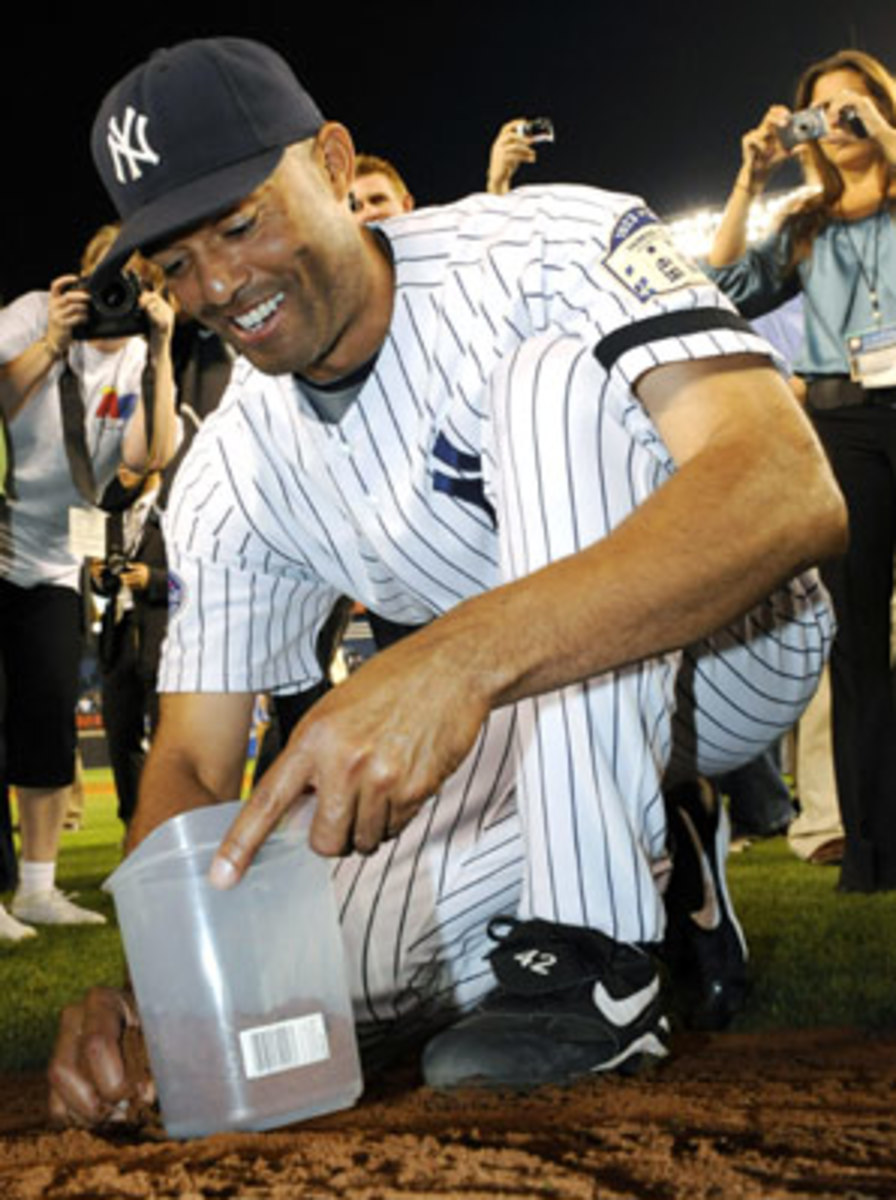
Fittingly, Rivera closes out Stadium
NEW YORK -- For the 54,000-plus fans who filled Yankee Stadium one last time on Sunday night, they could be forgiven if they thought it was October. It sure felt that way. Indeed, so much about Sunday night had the familiar feel of Yankee Stadium celebrations past. The incessant flashbulbs firing like blinking lighters at a Springsteen concert, practically begging for just one more encore. The full-throated sing-along to Ronan Tynan's rendition of God Bless America. The rhythmic clapping and chanting for their heroes. The massive police presence, accompanied by charging horses, the moment the final out was recorded. The mob scene on the mound by the players, followed by the victory lap to thank those same fans.
The only part that didn't go according to script was the date: Yankee Stadium celebrated a finish that had all the trappings of October, but did so in September.
So perhaps it was fitting that if this Yankees team was going to be the first since 1993 to not reach the postseason, at least the current Yankees who were the stars of the glorious Octobers of recent past would manage to evoke memories of those more victorious times by taking center stage in the House That Ruth Built one more time.
Starting pitcher Andy Pettitte, shortstop Derek Jeter and closer Mariano Rivera looked very much as they did while forming the backbone for four Yankees World Series winners from 1996 to 2000. Pettitte labored through his five-plus innings, but just as he did so often before in big games, evicted himself from enough sticky situations to get the win. And while Jeter's night was a disappointment at the plate -- an 0-for-5 that included a bases-loaded strikeout -- he managed to make his one of his signature plays in the field, ranging far to his left to scoop up a seventh-inning groundball and throwing across his body while on the run to get the out.
And of course, there was Rivera. There was no doubt that this game would end, as 230 Yankees victories in this ballpark had before it, with the skinny Panamanian on the mound, victory a certainty. Sunday night was a night to celebrate the men and the moments who made the Stadium so magical, but it is Rivera's fate -- the curse of his brilliance -- that his career has been so free of drama, so overwhelming in its dominance, that it lacks the type of signature moments that the other Yankees who were honored on this night are so readily defined by. In fact, a case can be made that Rivera is burdened, like Dennis Eckersley before him, to carve out a Cooperstown career that had its most notable moment in defeat, Eckersley's coming when he surrendered Kirk Gibson's famous home run in the 1988 World Series, and Rivera's when he shockingly blew a one-run lead in Game 7 of the 2001 World Series.
Of course, that isn't the only moment Rivera will be known for. Not with his Hall of Fame plaque already in the hands of the engravers. In fact, the moment of his career that most Yankees fans will cherish most came, of course, in this ballpark. Three innings of scoreless domination against the Boston Red Sox in in Game 7 of the 2003 ALCS. And as soon as Aaron Boone's now famous home run had nestled into the joyous arms of the fans in the leftfield stands, Rivera's emotion was of a different sort: he cried. While Boone circled the bases, Rivera ran to the mound, collapsed to his knees and sobbed.
He returned to that spot again after Sunday night had passed into Monday morning. He had made no secret that he would take a memento from the Stadium and, for now, this would have to do. Carrying an ordinary plastic container, Rivera went to the mound, fell to his knees once again, and scooped, filling the jar with the dirt of the mound he had made his own in 14 seasons in the Bronx. Asked later what he would do with it, he said, "It's going in a trophy jar in home."
Rivera's entire career is a keepsake, and not just for the statistics he has produced or the wins he has secured. He, along with Jeter, catcher Jorge Posada, and former centerfielder Bernie Williams, helped remake the Yankees from the zoo-like atmosphere of the 1980s into the professional band of champions they became in the 1990s. "I've been in other bullpens where it's all fun and games," said Rivera's bullpen-mate, Brian Bruney. "Not here. Here we're all in on every pitch, and that's because of Mo. He's changed the way I approach things out there, and that's something I'll take with me for the rest of my career."
Even the stoic Rivera could not ignore the extra jolt of adrenaline that accompanied him when he bolted out of the bullpen gates one more time to the pulsing beat of Enter Sandman. "I was so caught up in the emotion, I think I got there faster than ever," he said afterward.
His performance didn't last much longer. It took just 10 pitches for Rivera to finish off the Orioles, and with them, Yankee Stadium's glorious history.
Rivera, Jeter, Pettitte and Posada posed in uniform for a picture on the field after the game was over, the homegrown stars so responsible for returning the Yankees franchise to prominence. Asked later it meant to be a symbol of Yankees greatness on par with the Murderer's Row teams of the '20s and '30s or the coolly efficient dynasties of the '40s and '50s, Rivera paused. "It's like DiMaggio said: I want to thank the good Lord for making me a Yankee," he said. There are millions of fans who feel exactly the same way.





